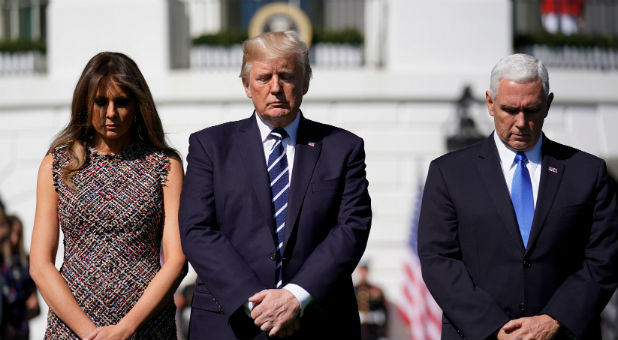Dear President Trump, Stop Acting Pastoral and Start Being Prophetic
President Trump addressed the nation on the mass murder in Las Vegas, in which at least 58 people (at last count) have died, and in which hundreds are wounded. It is the worst mass shooting in recent American history.
Except, President Trump did not exactly sound presidential.
He sounded pastoral. He delivered a sermon, complete with phrases from the Psalms—calling upon God who is the “healer of broken hearts.”
It was as if he had access to a pile of yizkor (memorial) sermons that rabbis had delivered to their congregations barely 24 hours before the horror took place.
Trump’s words point to a design flaw in what the late sociologist Robert Bellah 50 years ago called “civil religion.”
Americans embrace a common “civil religion” with certain fundamental beliefs, values, holidays and rituals, parallel to, or independent of, their chosen religion.
In that sense, presidents have a major role in American civil religion. They often serve as priests or pastors, as was the case with Abraham Lincoln. This is most often the case when public events call for a kind of religious interpretation, such as at a time of war, or in the wake of the Sept. 11 attacks.
If presidents tend to serve as priests or pastors, it is because American civil religion is mostly priestly and pastoral. It tends to define the present reality, and to offer comfort regarding that reality.
As a rabbi, I understand the pastoral response to tragedy: “I will hold your hand, and walk with you in your sorrow.” In the words of Ecclesiastes, which Jews will read during the coming festival of Sukkot, “[there is] a time to weep” (Eccl. 3:4a).
But, the pastoral response to national tragedy only takes us so far, and it leaves us empty.
The author of Ecclesiastes goes on to say: “there is a time to plant, and a time to uproot what is planted” (Eccl. 3:2b).
In this season of confession, let me confess: Given the amount of violence in our society, I have toyed with the idea of purchasing a gun for protection. I understand those who have made that choice.
But, what I simply cannot understand is how that choice for personal safety extends itself to the unfettered right to own assault weapons. Even for those who like to go hunting, I find such choices unreasonable, and demonstrably lethal.
This toxic idea of the absolute right to gun ownership—of whatever kind—is firmly planted in the American imagination. Let’s “uproot what is planted.”
That brings me back to the religious language that President Trump used today.
I am fine with a God who binds up the wounds of those who have been wounded by life, to use the psalmist’s felicitous phrase.
But, that is not the vision that we need.
No longer pastoral. No longer the sanctification of what is. American civil religion needs to be prophetic as well. From what is—to what should be.
And what should be—is an America where we no longer call upon God to bind wounds. It would be an America where we ask for no more unnecessary, cruelly, humanly inflicted wounds.
Yes, gun owners have rights.
But, the people who innocently went to a country music concert; the dancers in the Pulse nightclub in Orlando; schoolchildren in Connecticut (I flirt with the danger of carpal tunnel syndrome, brought upon by the typing of too many deaths): They also have rights.
They have rights to life—as surely as do, oh, say, fetuses at the point of five months of gestation in the womb.
That is the kind of American civil religion that we now need, and which needs the president’s voice.
Mr. President: You have shown enormous skill in getting angry. You do it so well.
You have been angry at the mayor of San Juan. You have been angry at football players who are exercising their American rights to free expression.
Mr. President: This is the time for your anger.
I invite your anger: at American gun culture.
Don’t preach like the psalmist. It is not just about compassion for those who are bereaved.
Preach like Isaiah. Make it about justice—so that no more parents, spouses, children, siblings and friends will suffer this cruel species of bereavement.
Oh, one last thing.
It’s about that ubiquitous phrase: “our thoughts and prayers …”
I believe that “thoughts and prayers” have their proper place. But, quite often, I do funerals for people who have died of terrible diseases. Their loved ones request donations to organizations that work on curing those diseases.
“Thoughts and prayers” are good.
“Action?” In this American moment—far, far better. {eoa}
© 2017 Religion News Service. All rights reserved.
















































